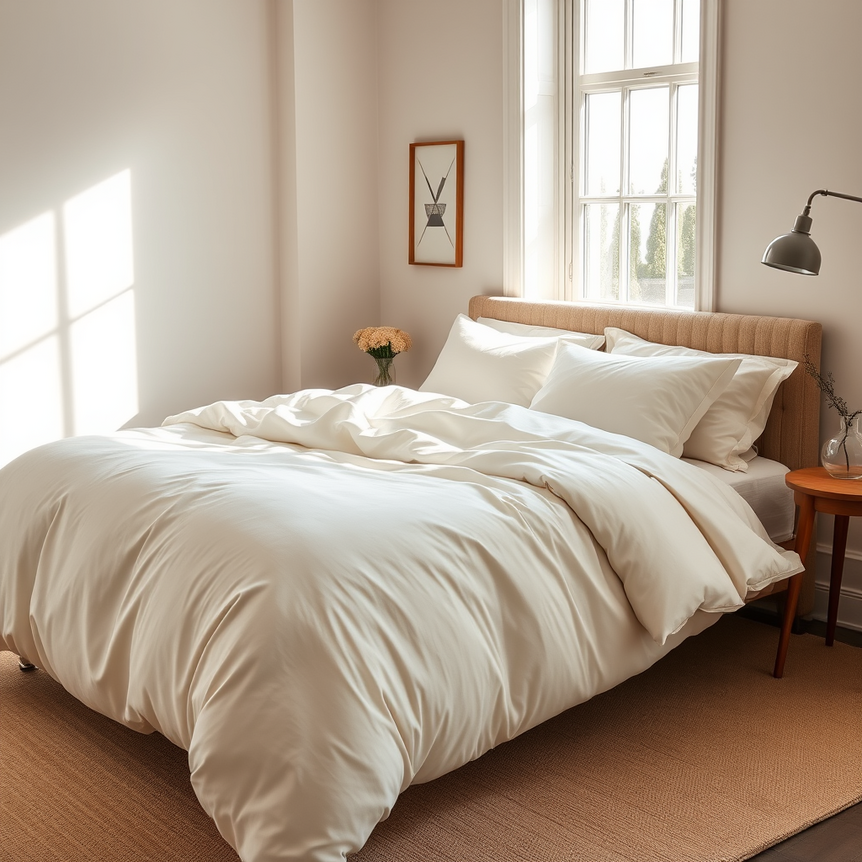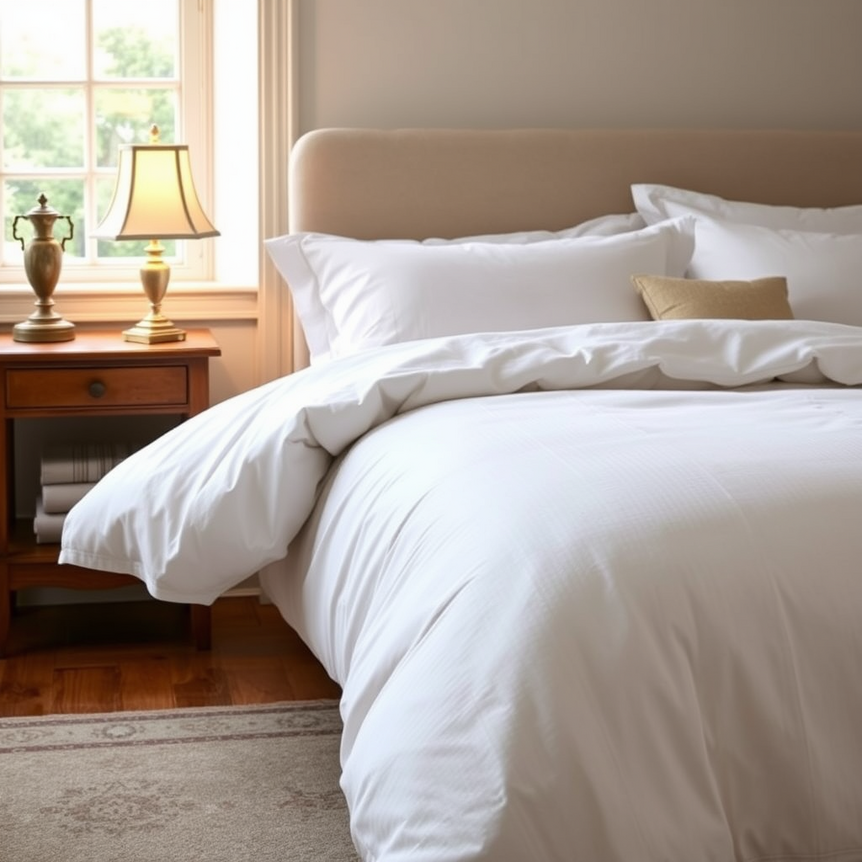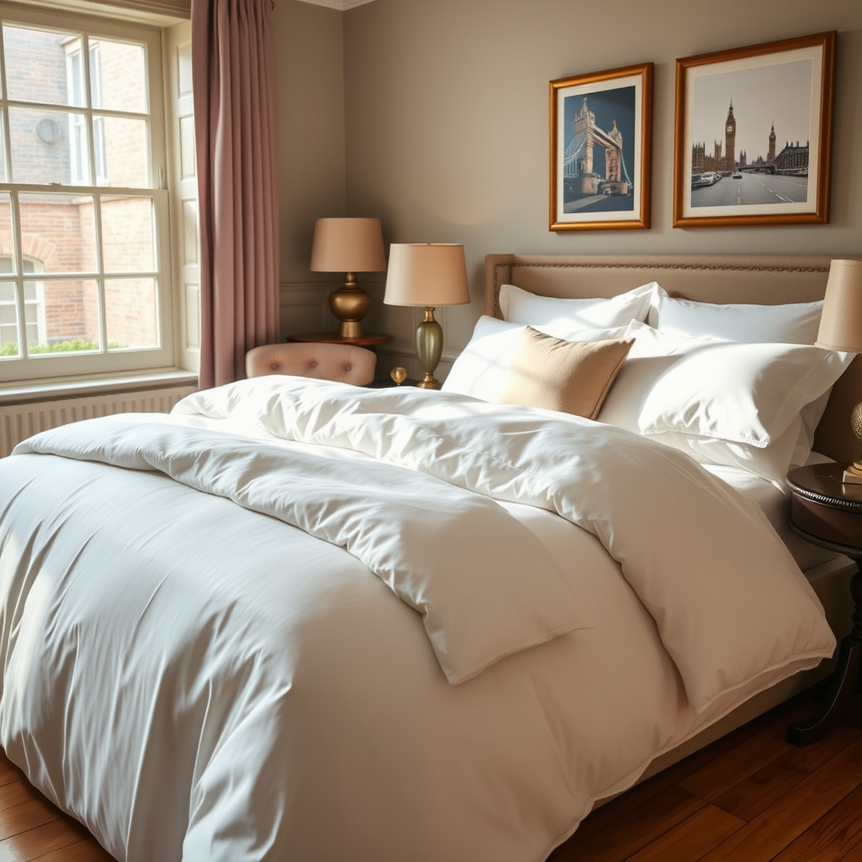Choosing the perfect duvet can transform your bedroom into a haven of comfort, style, and durability. When deciding between Egyptian cotton and regular cotton duvets, understanding the differences in fiber quality, weave, and care will help you make a smart investment in your home decor. Here, we explore how Egyptian cotton compares with regular cotton duvets so you can find the bedding that fits your lifestyle, budget, and desired level of sleep comfort.
Understanding the Superiority of Egyptian Cotton
Egyptian cotton is renowned worldwide as the gold standard of luxury bedding. It’s exclusively grown in Egypt’s Nile River Valley, where the unique soil composition and ideal climate nurture extra-long staple (ELS) fibres. These fibres are significantly longer than those found in regular cotton varieties, contributing to their exceptional quality and durability. This distinctive duvet material stands apart due to its inherent characteristics.
What Makes Egyptian Cotton Fibres Unique?
- Extra-Long Staple (ELS) Fibres: Unlike the shorter fibres of standard cotton, Egyptian cotton boasts exceptionally long fibres. This allows for the creation of incredibly fine, yet strong, threads. These longer fibres mean fewer joins in the yarn, which translates into a smoother, more lustrous fabric that is highly resistant to pilling and breakage over time. This is a crucial factor for bedding quality.
- Superior Strength: The length and strength of Egyptian cotton fibres make the resulting fabric remarkably durable. Duvets made from Egyptian cotton are less prone to tearing, fraying, and general wear and tear, ensuring a longer lifespan for your investment.
- Unmatched Softness: The fine yarns spun from ELS cotton create a fabric with an exquisitely soft and smooth feel against the skin. What’s more, Egyptian cotton actually becomes softer with each wash, improving its luxurious feel over its lifespan.
- Enhanced Breathability and Temperature Regulation: The structure of Egyptian cotton fibres allows for excellent air circulation. This natural breathability helps regulate body temperature, keeping you cool and comfortable during warmer nights and providing insulating warmth in colder months. This makes it an ideal choice for year-round sleep comfort.
The Contrast with Regular Cotton
In contrast, “regular cotton” typically refers to varieties like Upland cotton, which are grown globally and generally have shorter staple fibres. While still a natural and comfortable duvet material, these shorter fibres often result in a less uniform yarn that can feel coarser and is more susceptible to pilling and reduced durability. This is a key distinction when evaluating fabric differences and bed linen choices.
Key Factors Impacting Duvet Quality: Thread Count, Weave, and Fibre Length
When comparing Egyptian cotton to regular cotton duvets, three major factors govern overall quality and your experience:
Understanding Thread Count in Bedding
Thread count explained: This refers to the number of horizontal and vertical threads woven into one square inch of fabric. Egyptian cotton duvets often feature a higher thread count, generally starting above 300. This density creates a soft, smooth surface and contributes significantly to high durability and the luxurious feel. However, it’s important to note that an extremely high thread count (e.g., above 600) doesn’t always guarantee superior quality. The quality of the fibre itself, like the long-staple cotton of Egyptian varieties, and the fabric finish are equally, if not more, important.
Weave Types and Their Impact on Feel
The weave of the fabric significantly impacts its feel and appearance. Two common weaves for cotton bedding include:
- Percale: This is a classic plain weave that produces a crisp, cool, and matte finish. Percale woven Egyptian cotton duvets are highly breathable and offer a fresh, hotel-like feel, making them ideal for warm climates or those who prefer a cooler sleep.
- Sateen: This weave uses more threads on the surface, creating a silky-smooth, lustrous finish with a subtle sheen. Sateen woven Egyptian cotton bedding feels incredibly soft and drapes beautifully, embodying the essence of luxury bedding. While slightly less breathable than percale, its indulgent feel is highly sought after.
The Importance of Fibre Length
As discussed, the fibre length is paramount. Long-staple cotton from Egyptian varieties allows for the spinning of incredibly strong, fine, and smooth yarns. This directly translates into a fabric that is softer, more durable, and less prone to pilling and breaking. Shorter fibres, typical of regular cotton, result in a coarser texture and a shorter lifespan for the duvet, meaning they may not be as good for an investment bedding choice.
Comfort and Durability: Why Egyptian Cotton Duvets Often Outperform Others
Egyptian cotton duvets truly excel in combining superior comfort with long-term performance, making them a worthwhile bedroom upgrade. The inherently smooth fibres reduce friction against the skin, offering an unparalleled soft touch that not only feels luxurious initially but also remains so, wash after wash. This superior quality also drastically reduces fibre breakage, preventing the duvet from becoming rough, thin, or developing unsightly pills over time. This makes for a more consistently comfortable and aesthetically pleasing bed linen experience.
Moreover, Egyptian cotton’s exceptional breathability makes these duvets excellent for all-season comfort. They are often cooler and less prone to trapping heat and moisture compared to standard cotton, ensuring a more restful sleep regardless of the outside temperature. This natural temperature-regulating property is a key benefit for achieving optimal sleep comfort.
While regular cotton duvets can feel soft straight out of the packaging, they generally tend to lose their texture faster and may pill or tear earlier under frequent use and washing. This difference in bedding quality becomes evident over time, highlighting Egyptian cotton as a more durable and lasting choice.
Pricing and Budget Considerations for Choosing Your Perfect Duvet
Egyptian cotton duvets naturally command a premium price due to the meticulous cultivation process, the superior quality of the ELS fibres, and their enhanced durability. When making a purchase in the UK, here’s what to consider:
- Egyptian Cotton Duvets: Expect prices to range from mid-range to high-end. While the initial investment is greater, their superior longevity and performance make them a highly cost-effective long-term choice. They are an investment bedding option that pays dividends in comfort and durability over many years.
- Regular Cotton Duvets: These are generally more affordable upfront, making them a suitable option for budget-conscious buyers, guest rooms, or temporary living situations. However, their shorter lifespan means they may need more frequent replacement, which could negate some of the initial savings over time.
If budget is a primary concern but you still desire some of the luxurious feel of Egyptian cotton, consider opting for high-quality Egyptian Cotton Duvet Cover Bedding Set. Pairing this with an affordable synthetic or blended duvet filling can help you balance comfort, style, and expense. This allows you to experience the unparalleled softness and elegance of Egyptian cotton against your skin without a full premium investment in the duvet itself.
Style and Care Tips: Maintaining Your Egyptian or Regular Cotton Duvet
Proper care is essential to keep your cotton duvet looking fresh, feeling soft, and lasting longer, whether it’s luxurious Egyptian cotton or standard regular cotton. Following these simple easy care bedding guidelines will help preserve its quality.
Washing Guidelines
- Use Gentle Detergents: Always opt for mild, liquid detergents. Harsh chemicals or excessive fabric softeners can degrade the fibres over time, reducing the lifespan and softness of your duvet.
- Cool or Warm Cycle: Wash on a cool or warm cycle (around 30-40°C or 86-104°F). Hot water can cause shrinkage, colour fading, and damage to the cotton fibres.
- Avoid Bleach: Bleach is highly corrosive to cotton fibres and will weaken them, leading to premature wear and discolouration.
- Separate Colours: Always wash whites and colours separately to prevent dye transfer.
Drying Techniques
- Air Dry or Low Heat Tumble Dry: Air drying is the most gentle method and helps prevent shrinkage and wear. If using a tumble dryer, select a low heat setting and remove the duvet promptly once dry to avoid wrinkles and excessive heat exposure.
- Avoid Over-Drying: Over-drying can make cotton brittle and reduce its lifespan.
Ironing and Storage
- Ironing: For Egyptian cotton, ironing on a low setting can help maintain its characteristic smoothness and crispness, enhancing its aesthetic appeal as luxury bedding. Regular cotton may also benefit from light ironing to remove wrinkles.
- Proper Storage: When not in use, store your duvet in a cool, dry, and well-ventilated area. Avoid plastic bags, which can trap moisture and lead to mildew. A breathable cotton storage bag is ideal.
While regular cotton duvets may require more frequent replacement due to faster wear, following these similar care instructions will significantly prolong their usability and maintain their quality for as long as possible.
Direct Comparison: Egyptian Cotton vs Regular Cotton Duvets at a Glance
To help you visualise the fabric differences and make an informed decision for your UK bedding needs, here’s a direct comparison:
| Feature | Egyptian Cotton Duvet | Regular Cotton Duvet |
|---|---|---|
| Fibre Length | Extra-long staple (ELS) | Short to medium staple |
| Softness | Luxuriously soft, smooth; improves with washing | Softer initially; tends to lose softness and texture faster |
| Durability | High; exceptional resistance to pilling, tearing, and wear | Moderate to low; more prone to pilling and wear over time |
| Breathability | Excellent; highly temperature regulating, ideal for all seasons | Good, but can sometimes trap more heat |
| Thread Count | Typically 300+ (often higher for premium quality) | Typically 150 – 250 |
| Price Range | Medium to high; considered an investment bedding option | Low to medium; more budget-friendly upfront |
| Care | Gentle washing, low heat drying recommended for longevity | Similar care, but may show signs of wear quicker |
| Lifespan | 10+ years with proper care | 3-5 years typically |
Frequently Asked Questions about Egyptian Cotton and Regular Cotton Duvets
Here are some common questions answered to further assist your decision-making process when selecting the best duvet material for your home:
Q: Is Egyptian cotton worth the higher price for a duvet?
A: Yes, if you prioritise bedding quality, lasting softness that improves with time, and a more durable duvet that resists wear, Egyptian cotton is generally considered a worthy investment bedding. Its extended lifespan often makes it more cost-effective in the long run.
Q: Can I use a regular cotton duvet if I have sensitive skin?
A: While high-quality regular cotton can be suitable, Egyptian cotton is generally better for sensitive skin due to its exceptionally smoother and longer fibres. These fibres create a fabric with less friction and fewer loose ends, reducing the potential for irritation, making it an excellent choice for hypoallergenic duvets.
Q: How can I verify Egyptian cotton authenticity?
A: Look for reputable retailers and specific certifications, such as the Cotton Egypt Association’s “Egyptian Cotton™” trademark. Authentic Egyptian cotton products will prominently state their origin and often come with a certification label or hologram ensuring their genuineness. Be wary of generic ‘Egyptian quality’ claims.
Q: Are Egyptian cotton duvets suitable for all seasons in the UK?
A: Absolutely. Their exceptional breathability and natural moisture-wicking properties make them highly effective at regulating body temperature, ensuring you stay cool in summer and warm in winter. This makes them a versatile and comfortable choice for year-round sleep comfort in UK climates.
Q: How often should I replace a cotton duvet?
A: With proper care, a high-quality Egyptian cotton duvet can last 10 years or even more, offering significant value. Regular cotton duvets, due to their shorter fibres and lesser durability, typically need replacing every 3-5 years, depending on frequency of use and care.
Choosing between an Egyptian cotton duvet and a regular cotton duvet ultimately depends on your priorities—be it budget, desired comfort level, or long-term durability. For UK homes seeking timeless elegance, superior comfort, and lasting quality, Egyptian cotton offers unmatched value and elevates your bedroom upgrade. Explore our range at Rugstars UK for expert-approved choices designed to enhance your bed linen experience and add a touch of luxury to your home.



